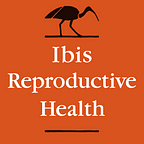The first state that tried to ban abortion after Dobbs has finally succeeded
This piece was coauthored by Bria Goode and Caitlin McKenna who are both researchers at Ibis Reproductive Health.
The history behind Indiana’s abortion ban
After a year of court battles, the uncertain future of legal abortion care in Indiana has been decided — at least for now. Last week, the Indiana Supreme Court denied to rehear any arguments against a near-total abortion ban, claiming it does not violate the state’s constitution. This motion reaffirmed the court’s original decision on June 30, 2023 that Indiana has the authority to restrict abortion care. While the ban allows exceptions in some cases, research shows the burdens of proof for such exceptions are extremely difficult to meet. In addition, the ban limits abortion care to hospitals and removes the licensure of abortion clinics, forcing all independent clinics to cease providing care.
Indiana became the first state to sign, pass, and begin enforcing a new law banning abortion following the Dobbs v. Jackson decision that overturned Roe v. Wade in June 2022. Indiana’s ban was initially approved in August 2022 and temporarily went into effect in September of the same year before it was put on hold while the ACLU of Indiana — on behalf of various abortion providers and advocates — challenged the law’s violation of Hoosiers’ right to privacy and equal privileges protections. However, once the state’s Supreme Court ruled the ban could go back into effect earlier this summer, abortion clinics started winding down services. Now with the new ban officially in place, many Hoosiers will be forced to carry their pregnancies to term, leave the state for care, or self-manage their abortions.
About the Hoosier Abortion Access Study
Abortion restrictions in Indiana have burdened Hoosiers since long before the post-Dobbs ban was proposed and implemented. From limitations on insurance coverage to state-mandated “counseling” with medically inaccurate information and targeted regulation of abortion provider (TRAP) laws, Indiana has enacted more abortion restrictions in the past 50 years than most other U.S. states. It was in this highly restrictive context that Ibis teamed up with Indiana University, All-Options, Chicago Abortion Fund, and Kentucky Health Justice Network to study the impact of such barriers on seeking and providing abortion care. Watch the video below to hear the stories of the abortion seekers, healthcare workers, and abortion fund organizers who participated in our Hoosier Abortion Access Study.
Between June 2021 and June 2022, our study team surveyed over 400 Indiana residents, and conducted interviews with 40 abortion seekers and 19 clinicians and staff providing in-state abortion care. One in four participants who had an abortion traveled out of state to get their care. On average, those who traveled out of state had their abortions about three weeks later than participants who had an abortion in Indiana (11 weeks vs. 8 weeks of pregnancy). In the surveys, Hoosiers reported multiple intersecting barriers to getting abortions, most frequently the need to gather money (70%). Of the 78% who had an abortion appointment scheduled at the time of the first survey, only 34% could afford it. This difficulty around funding was echoed in our interviews:
“I had to spend my rent money to get an abortion and then, now, I’m still in rent debt — and I’m probably going to get evicted all because of this [abortion], but we’ll see.”
— 24-year-old Hoosier
As Qudsiyyah shares in the video, funding abortion is community care. While Indiana’s government has removed the possibility of in-state care for most Hoosiers, abortion funds and practical support organizations continue to offer mutual aid by redistributing donations from people across the country so that abortion seekers can get the care they need. If you can, show some love to a Midwest abortion fund or a fund that’s local to you, and share this video with your networks!
